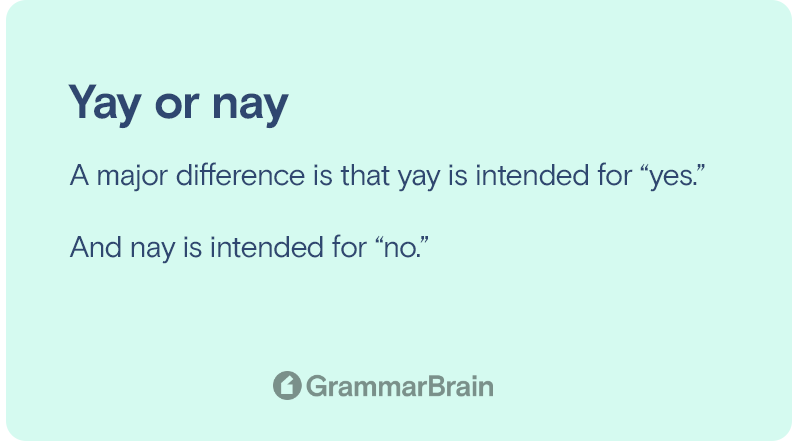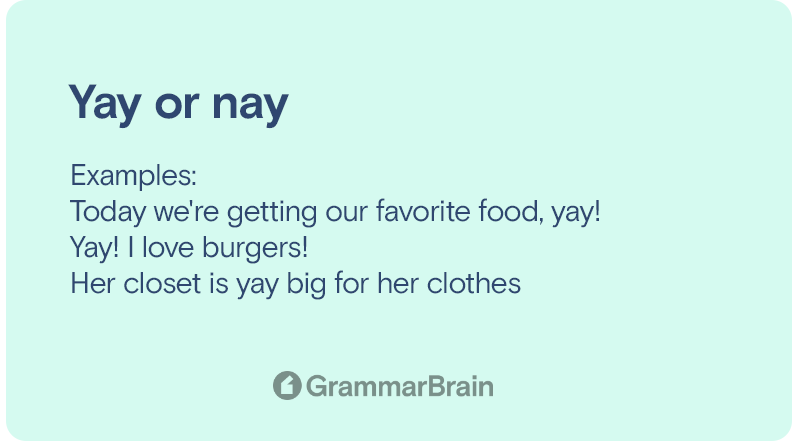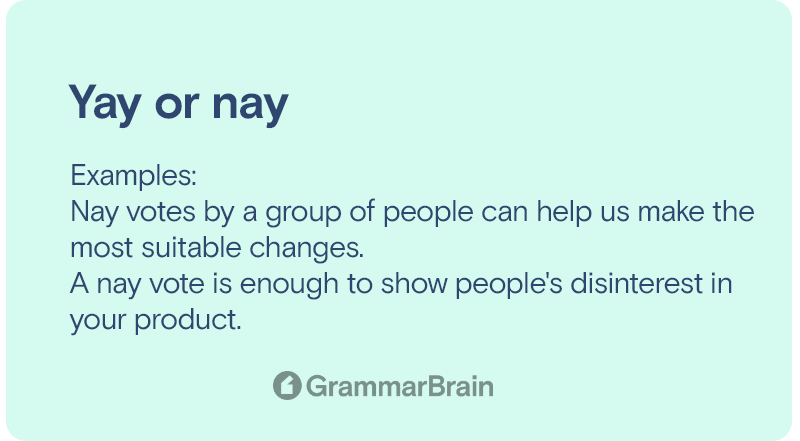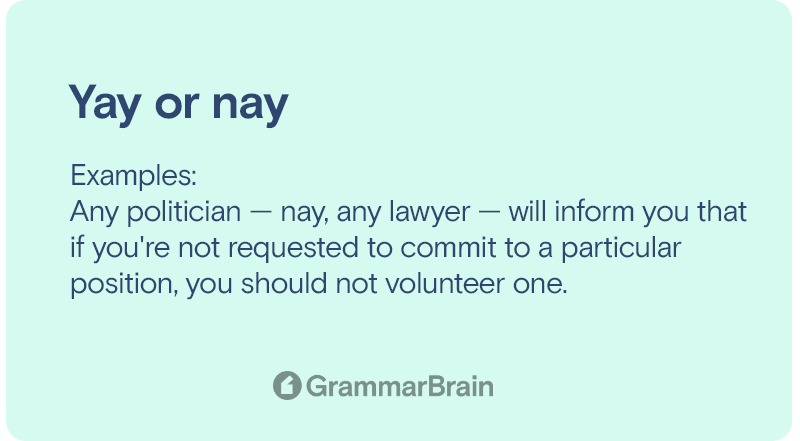Is it yay or nay? No doubt English is a versatile old language. However, that doesn’t mean all English words are as old as the English language. Yay or nay was absorbed into the English language relatively late.
To be precise, it was near 1963 when the word “Yay” evolved from “Yeah” (a common English word) which was an informal practice of saying “YES.”

In terms of “Oral Voting”, Yay or nay evolved and become popular where individuals were sometimes asked to speak out loud about their opinion on some matters. Moreover, it is also common to use to express excitement.
However, today, in this article below, we are going to discuss the difference between the word “Yay” and the word “Nay”. Also, we will provide the definition and usage example here. Let’s have a look
Definition and Meaning of Yay or Nay
Let’s know what Yay Or Nay means in the early modern English language.

The Word “Yay”
Yea is an idiomatic Affirmative Exclamation, and from this word, some people have started emerging usage of “Yay” in place of “yea”. The spelling Yay is generally used for expressing excitement. Only Collins English Dictionary holds an entry for the word “yay”, and it is just for the exclamatory sense.
Thus, the word YAY does appear as a substitution for the word Yea in spoken context, but no authorities countenance Yay yet at all. Some people believe it came from the words “Yea” or “Yeah”, but there is no written proof for that.
Interestingly, many of the top Google Search results are found for the yay which is not a correct spelling. Anybody who knows the difference would instantly identify yay for yeah or yea as an error.

Usage of yay
Yay is a somewhat specialized word that is generally used in a spoken context in everyday speech. Here are a few uses of the word YAY:
- Today we’re getting our favorite food, yay!
- Yay! I love burgers!
- Her closet is yay big for her clothes.
- Yay! I can’t keep calm since my favorite player is playing today.
- Yay! I won the match.
The Word “Nay”
Nay is generally used to signal a “No” Vote. It’s generally used for expressing disagreement. Nay rhymes with the word “neigh” which is instead used for a horse sound or whinnying sound.
The two words yay and nay derive from the Old Norse NEI influences. It means that yea and nay probably developed between 801 CE-1300 CE, where Old English and Old Norse are pretty concurrent.
Generally, people use the word Nay for a refusal of something.

Usage of nay
Here is a brief set of good examples using nay in the sentences
- Nay votes by a group of people can help us make the most suitable changes.
- A nay vote is enough to show people’s disinterest in your product.
- Nay, stop it right now!
- Nay, don’t fight with your brother!“I vote nay to express my disinterest in the matter.
However, you can also use the word Nay to emphasize an appropriate word option than the ones we mentioned above.
For instance:
- Any politician — nay, any lawyer — will inform you that if you’re not requested to commit to a particular position, you should not volunteer one.
- I’ll need 2, nay, 3 new pens
Conclusion
We hope that the definition, meanings, and examples are good enough for you to understand the Yay and Nay differences. The big difference between the two words is that Yay is not a correct spelling but only an oral voting method used in place of YEA. Yay is mainly used to express excitement.
On the other hand, there are written uses for Nay, and this word is used to show disagreement with something or vote negatively. You can also use Nay to refuse something.
FAQs
Is it correct to say yay or nay in English?
If you want to express your excitement, you can say YAY, and if you want to express your disagreement with something, you can say Nay. However, these are mainly used in spoken context in English.
What do yay and nay mean in voting?
Well, the accurate term here is “Yea and Nay” instead of “Yay and nay”. So, when you say Yea to vote, it means you agree to the matter. However, when you say Nay, it means you do not agree with the matter.
Yea: Affirmative or Yes.
Nay: Disagreement or No.
What Does Yay mean?
Yay is an acceptable alternative for Yea (only for oral uses, mainly for affirmative vote). It is primarily a common word to express excitement, joy, or approval. The two spellings Yay and Yea are different but mean the same thing.
Inside this article
Fact checked:
Content is rigorously reviewed by a team of qualified and experienced fact checkers. Fact checkers review articles for factual accuracy, relevance, and timeliness. Learn more.
Core lessons
Glossary
- Abstract Noun
- Accusative Case
- Anecdote
- Antonym
- Active Sentence
- Adverb
- Adjective
- Allegory
- Alliteration
- Adjective Clause
- Adjective Phrase
- Ampersand
- Anastrophe
- Adverbial Clause
- Appositive Phrase
- Clause
- Compound Adjective
- Complex Sentence
- Compound Words
- Compound Predicate
- Common Noun
- Comparative Adjective
- Comparative and Superlative
- Compound Noun
- Compound Subject
- Compound Sentence
- Copular Verb
- Collective Noun
- Colloquialism
- Conciseness
- Consonance
- Conditional
- Concrete Noun
- Conjunction
- Conjugation
- Conditional Sentence
- Comma Splice
- Correlative Conjunction
- Coordinating Conjunction
- Coordinate Adjective
- Cumulative Adjective
- Dative Case
- Determiner
- Declarative Sentence
- Declarative Statement
- Direct Object Pronoun
- Direct Object
- Diction
- Diphthong
- Dangling Modifier
- Demonstrative Pronoun
- Demonstrative Adjective
- Direct Characterization
- Definite Article
- Doublespeak
- False Dilemma Fallacy
- Future Perfect Progressive
- Future Simple
- Future Perfect Continuous
- Future Perfect
- First Conditional
- Irregular Adjective
- Irregular Verb
- Imperative Sentence
- Indefinite Article
- Intransitive Verb
- Introductory Phrase
- Indefinite Pronoun
- Indirect Characterization
- Interrogative Sentence
- Intensive Pronoun
- Inanimate Object
- Indefinite Tense
- Infinitive Phrase
- Interjection
- Intensifier
- Infinitive
- Indicative Mood
- Participle
- Parallelism
- Prepositional Phrase
- Past Simple Tense
- Past Continuous Tense
- Past Perfect Tense
- Past Progressive Tense
- Present Simple Tense
- Present Perfect Tense
- Personal Pronoun
- Personification
- Persuasive Writing
- Parallel Structure
- Phrasal Verb
- Predicate Adjective
- Predicate Nominative
- Phonetic Language
- Plural Noun
- Punctuation
- Punctuation Marks
- Preposition
- Preposition of Place
- Parts of Speech
- Possessive Adjective
- Possessive Determiner
- Possessive Case
- Possessive Noun
- Proper Adjective
- Proper Noun
- Present Participle
- Prefix
- Predicate



